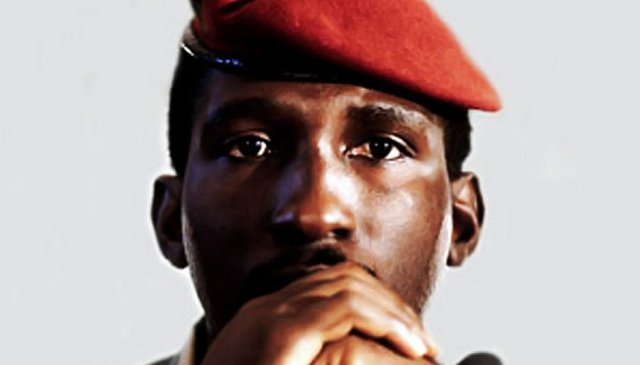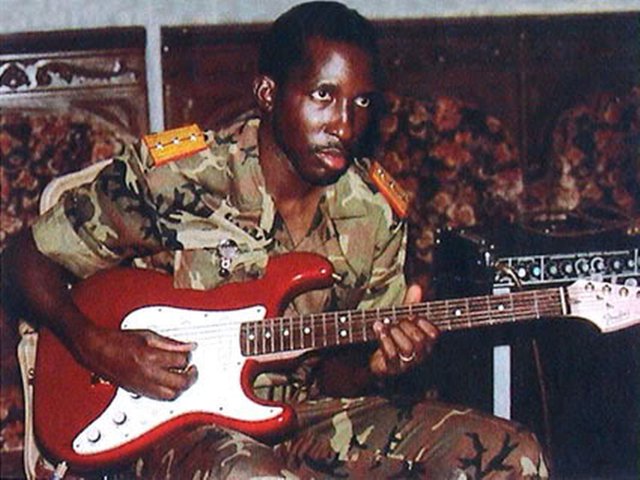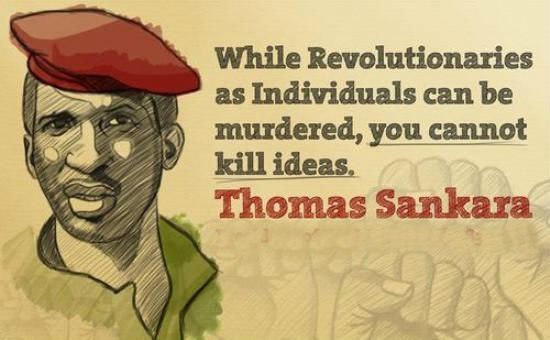Unsung hero of africa "Thomas Sankara"

Thomas Sankara, born on December 21, 1949 in Yako, Upper Volta, and murdered on October 15, 1987 in Ouagadougou, Burkina Faso, is an anti-imperialist, pan-Africanist and Third-World Voltaic politician, then a Burkinabe head of state. The Republic of Upper Volta, renamed Burkina Faso, from 1983 to 1987.
He is the president of the country during the period of the first Burkinabe revolution from 4 August 1983 to 15 October 1987, which he finally totally embody. During these four years, it led to a forced national emancipation policy (which, for example, was achieved by changing the name of Upper Volta from colonization into a name derived from the African tradition: Burkina Faso, which is a mixture Of moré and dioula and signifies a country of integrity), development of the country, fight against corruption or the liberation of women. The National Revolutionary Council of Thomas Sankara, however, exercised a veritable dictatorship5 which resulted in multiple exactions against the population.
He was shot dead in a coup that brought his brother-in-arms, Blaise Compaoré, to power on 15 October 1987. His memory is still alive in the youth of Burkina Faso, but also more generally in Africa, which has made him an icon, An African "Che Guevara", alongside Patrice Lumumba.

Biography :
Thomas Isidore Noël Sankara is a Peul-Mossi from a Catholic family. His father is a veteran and a prisoner of war of the Second World War. He studied at the Ouezzin Coulibaly secondary school in Bobo-Dioulasso, the country's second-largest economy and then the second in the Baccalauréat, in Ouagadougou (political capital of Burkina Faso), at the Prytanée Militaire in Kadiogo. During his studies, he meets the children of settlers. He served Mass but refused to enter the seminary. Like Blaise Compaoré, he trained as an officer at the Ecole Militaire Inter-Armée (EMIA) in Yaoundé, Cameroon, and then at the Military Academy of Antsirabe in Madagascar (where he studied Political Science, Political Economy, French and Agricultural Sciences6), and in 1976 became Commandant of the CNEC, the National Commando Training Center, located in Po, in the province of Nahouri, 150 km south of the capital. In the same year, they took part in an internship in Morocco. Together, they founded the Regroupement des officiers communistes (ROC), whose best known members were Henri Zongo, Boukary Kabore and Jean-Baptiste Lingani.
During his studies in Madagascar, he attended in 1972 the revolution that led to the end of the neocolonialist regime of Philibert Tsiranana. This leads him to conceive the idea of a "democratic and popular revolution". In 1974, he illustrated himself militarily during the war with Mali. Captain, he then created a clandestine organization with other officers, approached far-left militants and made many readings
Entry into politics :
In the late 1970s and early 1980s, Burkina Faso underwent an alternation of authoritarian periods and parliamentary democracy. Politicians are cut off from the politicized urban petty bourgeoisie, and this split is reinforced by financial scandals. This brings young, ambitious officers willing to modernize the country like Thomas Sankara to invest in politics, posing in contrast to older and less educated politicians. A military coup d'état took place in November 1980, but the new regime, although popular, quickly proved repressive and linked the army with scandals.
In September 1981, he became Secretary of State for Information in the government of Colonel Saye Zerbo before resigning on April 21, 1982, live on television, saying: "Woe to those who gag the people."
On November 7, 1982, a new coup d'etat brought to power the military doctor Jean-Baptiste Ouédraogo. Sankara became Prime Minister in January 1983, a position gained by the balance of forces favorable to the progressive camp within the army, 7 but was sacked and put under house arrest on 17 May, probably under pressure from France
The Democratic and Popular Revolution :
A new coup d'etat, on 4 August 1983, in place of Thomas Sankara as President of the National Revolutionary Council.
On the domestic level, he defined his program as anti-imperialist, in particular in his "Discourse of political orientation", written in September-October 1983 by Valere Somé and recorded in the Council Chamber of the Entente and then distributed to the Radio on October 2, 1983.12 Thus, in November 1986, Thomas Sankara attacked France for cohabitation in the presence of François Mitterrand and before the cameras for hosting Pieter Botha, the prime minister of South Africa, and Jonas Savimbi Head of UNITA, both "covered with blood from the feet to the head". Therefore, in the eyes of Thomas Sankara, these rulers "bear today and always the responsibility" .
He declared that his aims were: "To refuse the state of survival, to relieve pressure, to liberate our campaigns from a medieval immobility or a regression, to democratize our society, to open minds to a universe of collective responsibility to dare to invent 'to come up. To break up and reconstruct the administration through another image of the civil servant, plunge our army into the people through productive work and remind him incessantly that without a patriotic formation a soldier is only a potential criminal. It is surrounded by competent cadres, defends the transformation of the administration, the redistribution of wealth, the liberation of women, the empowerment of youth, decentralization, the fight against corruption, etc. On 4 August 1984, the Republic of Upper Volta was renamed Burkina Faso.
On the domestic level, his government withdrew from the traditional chiefs the feudal powers they continued to exercise. It creates the CDR (Revolutionary Defense Committees), which are responsible locally for exercising power on behalf of the people, managing security, political training, sanitation of neighborhoods, production and consumption of local products or Budgetary control of the ministries. Sometimes they refuse after debate certain national projects, such as the "new school", which they consider too radical.
However, the CDR will tend to behave as a revolutionary militia that has reigned terror, fighting against trade unions (which are considered dangerous because of opposition from the IPA and the PCRV). Thomas Sankara, however, denounces certain excesses of CDRs, often linked to internal disputes6.
Operating spending decreases to strengthen investment. Wages are drained from 5 to 12% but rents are declared free for one year. In Ouagadougou, a wasteland is being rehabilitated in an industrial zone. The new regime aims to develop an economy no longer dependent on external aid, which Thomas Sankara describes as follows: "These food aids [...] which install in our minds ... beggar reflexes, Do not really want more! We must produce, produce more because it is normal that the one who gives you food also dictates his will. Imports of fruit and vegetables are prohibited in order to induce traders to supply themselves in production areas in south-west Burkina Faso; This is encouraged by the establishment of new distribution channels and a national chain store. The RDCs also allow employees to purchase products from their workplace. Officials are encouraged to wear the traditional dress (Faso dan fani), which leads many women to obtain a clean income by weaving this garment directly at home.
Concerned about the environment, he denounced human responsibilities in the advance of the desert. In April 1985, the CNR launched the "three struggles": end of abusive woodcutting and awareness campaign on the use of gas, the end of bush fires and the end of the wandering of animals. The government is carrying out dam projects while farmers sometimes build water reservoirs themselves. Thomas Sankara also criticizes the lack of aid from France, the majority of which benefit from contracts linked to major works6.
At the international level, its policy is endorsed by the alterglobalist movement, insofar as it criticizes the injustices of globalization, the financial system, the importance of the IMF and the World Bank and the debt of the third world countries In a vicious circle. Burkina Faso does not contract loans with the IMF, the organization wanting to impose its "conditionalities". Thomas Sankara considers this system to be a means of "savvly organized reconquest of Africa, so that its growth and development obey levels, norms that are totally foreign to us
Murder :
Thomas Sankara became embarrassing because of his struggle against neo-colonialism, threatening France's place in Africa and the power of other West African leaders to behave more docile. On 15 October 1987, Thomas Sankara was assassinated in a coup organized by one of his closest comrades, Blaise Compaoré (more willing to support the interests of France, Côte d'Ivoire by Felix Houphouet- Boigny and Libya of Muammar Gaddafi, who support this reversal6). A few days later, he was declared "dead of natural death" by a military doctor.
The perpetrators and circumstances of his death remain mysterious enough. The French government of the time - a government of cohabitation with Jacques Chirac Prime Minister and François Mitterrand President of the Republic - as well as several other African governments close to France, are thus suspected of having supported this assassination, as well as Gaddafi
His brother-in-arms, Blaise Compaoré, who succeeds him as head of Burkina Faso, is suspected of being the main cause of his murder.
Thomas Sankara and some of his comrades killed during the coup would be buried without grave in the cemetery of Dagnoën in Ouagadougou. Later, simple cement tombs were built.
On May 14, 2015, for the first time since 2007, Mariam Sankara returns to Ouagadougou after the overthrow of Blaise Compaoré to be heard by the judge charged with investigating her husband's death, 17 and is welcomed by several thousand people. Doubts remain about the actual place of Sankara's grave and in May 2015 a Burkinabe judge orders the exhumation of bodies from the cemetery of Dagnoën to determine if it is Sankara and what are the conditions of his death. On 6 December 2015, Gilbert Diendéré, author of the failed coup attempt in Burkina Faso in 2015, was charged with complicity in the assassination of Thomas Sankara on 15 October 1987.

Political Ideas and Actions
The anti-imperialist struggle
Thomas Sankara is one of the leaders of the Non-Aligned Movement. He met many left-wing activists in the 1970s and became friends with some of them. He set up a group of clandestine officers of Marxist influence: the Regroupement des officiers communistes (ROC).
In his speeches, he denounced colonialism and neo-colonialism, including that of France, in Africa (in particular the client regimes of Cote d'Ivoire and Mali, which repeatedly launched military actions against Burkina Faso, supported by France).
It is close to several countries of the socialist bloc. In October 1986, shortly before the Gorbachev-Reagan summit in Reykjavik, he visited the USSR for one week, but also in Cuba from 25 September to 1 October 1984 and then again in November 19867.
At the same time, it rejects the debt burden on developing countries. His speech against the debt, pronounced on 29 July 1987 at an OAU summit, is probably the best known speech of Thomas Sankara.
In front of the UN, he defends the right of peoples to eat to their hunger, to drink to their thirst, and to be educated. During these four years Burkina Faso was, according to geopolitical criteria born in the mid-1970s, the last revolution of "progressive Africa", opposed to "moderate Africa".
Burkina Faso President Thomas Sankara's 'Against debt' speech 1987:
Participatory Democracy :
Wishing to restore power to the people, in a logic of participatory democracy, it creates the CDR (Revolutionary Defense Committees) in which everyone can participate, who manage local issues and organize major actions. The RDCs are coordinated in the CNR (National Council of the Revolution). This policy was aimed at reducing malnutrition, thirst (with the massive construction of wells and water reservoirs by CDRs), the spread of diseases (thanks to the policies of "vaccinations commandos", notably children, Burkinabes or not) and Illiteracy (95% to 80% of illiteracy for men, and 99% to 98% for women due to "alpha operations").
Sankara also tries to break with the traditional unequal Burkinabe society, weakening the power of tribal leaders, and seeking to integrate women into society on an equal footing with men.
It institutes the custom of planting a tree at every great opportunity to combat desertification.
He is the only president of Africa to have sold the luxurious cars of State functions to replace them with Renault. He made all his travels in tourist class, his collaborators being obliged to do the same. He is also famous for his habit of always visiting Harlem (and making a speech) before arriving at the UN
Posterity :
Thomas Sankara
Thomas Sankara is considered today by a large part of the Burkinabe or even continental youth as a sort of "African Che Guevara" (despite their important differences). In Burkina Faso, a multitude of civil society parties and movements are demanding of him.
In 2006, the UN Human Rights Committee24 condemned the absence of any trial or investigation by the Burkinabè government. This symbolic decision is a world first in the fight against impunity.
Thomas Sankara was proclaimed a model by African youth at the 2006 African Social Forum in Bamako and at the Nairobi World Social Forum in 2007.
Since 28 December 2005, an avenue in Ouagadougou has been named as part of a more general rehabilitation process that was declared in 2000 but has been blocked since then. Various initiatives aim at bringing Sankarists and their supporters together, including through a national committee to organize the twentieth anniversary of his death, and to celebrate his memory, in particular through cultural events, both in Burkina Faso and in various Country of implantation of Burkinabè emigration. In 2007, for the first time in 19 years, Thomas Sankara's widow, Mariam Serme Sankara, was able to go and gather on her presumed grave during the 20th commemorations in Ouagadougou.
The various international networks, notably the CADTM (Committee for the Cancellation of Illegitimate Debts), made Sanakara's speech against the debt a sort of standard and reference in its struggle.
I advise you the documentary :
Thomas Sankara • The Upright Man Full Documentary
Historical speech by Thomas Sankara at the UN "full", Unfortunately I have not found English translation
source : https://en.wikipedia.org/wiki/Thomas_Sankara
source : youtube
I hope you like this post! You can follow me @anis33 so you don't miss my future posts
I will not nominate this for ocd, but I want to give you some advice. The theme is amazing, the Probleme is it resembels more a Wikipedia articel then a post, is has to much Information and to detailed. Also you Need to make the People want the People read your post, make it understandable and funny or interresting. Don't use to big chunks of text, I am not here to write a book about him, I just want some quike and interresting Information about him.
P.S. Sry fr my bad english.
merci beaucoup @Jeanpi1908 pour vos conseils j'apprécie, j'en prendrai compte.
bonne continuation et bonne journée
Congratulations! This post has been upvoted from the communal account, @minnowsupport, by anis33 from the Minnow Support Project. It's a witness project run by aggroed, ausbitbank, teamsteem, theprophet0, and someguy123. The goal is to help Steemit grow by supporting Minnows and creating a social network. Please find us in the Peace, Abundance, and Liberty Network (PALnet) Discord Channel. It's a completely public and open space to all members of the Steemit community who voluntarily choose to be there.
If you like what we're doing please upvote this comment so we can continue to build the community account that's supporting all members.